Text
Political Offices of the Presidents
George Washington
Delegate to Continental Congress (1774-1775)
John Adams
Delegate to the Continental Congress (1774-1778)
US Minister to the Netherlands (1782-1788)
Minister to England (1785-1788)
Minister to UK (1785)
VP of US (1789-1797)
Thomas Jefferson
United States Ambassador to France (1785-1789)
United States Secretary of State (1790-1793)
Vice President of US (1797-1801)
Governor of Virginia (1779-1781)
James Madison
Representative, VA 1789-1797
US Secretary of State 1801-1809
James Monroe
Secretary of War (1814-1815)
Secretary of state 1815-1817
Governor of Virginia 1811
Senator 1790-1794
Minister to UK 1803- 1807
US Ambassador to France 1794 -1796
John Q. Adams
Senator, MA – 1803 -1808
US Ambassador to UK 1815-1817
Secretary of State 1817-1825
Representative – MA 1843-1848
US Representative 1831-1833 & 1833-1843
Andrew Jackson
Senator of Tennessee – 1797 to 1798 & 1823-1825
Representative 1796-1797
Martin Van Buren
State Attorney General of New York 1815-1819
Minister to the UK 1831-1832
Secretary of State under Jackson 1829-1831
Vice President 1833-1837
Governor of New York 1829
William Henry Harrison
Secretary of Northwest Territory 1798-1799
Governor of Indiana *Territory 1800-1812
Representative of Ohio 1816-1819
Ohio State Senator 1819-1821
Senator 1825-1828
US Minister 1828-1829
John Tyler
Representative 1816-1821
Governor of Virginia 1825-1827
Senator of Virginia 1827-1836
Vice President 1841
James K. Polk
Representative of Tennessee 1825-1839
Governor of Tennessee 1839-1841
Millard Filmore
VP Of the US 1849-1850
New York State Comptroller 1848-1849
Franklin Pierce
Speaker of NH House of Reps 1832 -1833
Representative 1829-1837
Senator of New Hampshire 1837 – 1842
James Buchanan
Pennsylvania House of Representatives (1814-1816)
Representative, 3rd and 4th District PA (1821 - 1831)
US Minister to Russia (1832-1833)
US Senator of Pennsylvania (1834-1845)
US Secretary of State (1845-1849)
US Ambassador to the UK (1853-1856)
Abraham Lincoln
Illinois House of Representatives (1834-1842)
US House of Representatives - Illinois (1847-1849)
Andrew Johnson
•US House of Representatives - Tennessee (1843-1853)
•Governor of Tennessee (1853-1857)
•Military Governor of Tennessee (1862 - 1865)
•Vice President (March 4, 1865 - April 15, 1865)
•US Senator of Tennessee (March 4, 1875 - July 31, 1875)
Ulysses S. Grant
•United States Interim Secretary of War (1867-1868)
•Commanding General of the United States Army (1864-1869)
Rutherford B. Hayes
•Governor of Ohio (2 times) - 1868 to 1872 and 1876 to 1877
•US House of Representative from Ohio (1865-1867)
0 notes
Text
Rutherford B. Hayes
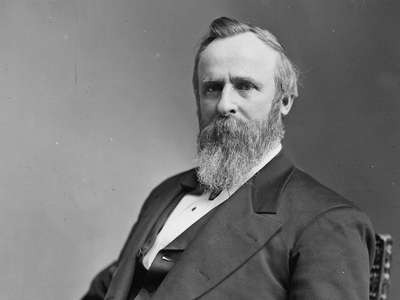
Rutherford B. Hayes
Basic Info
b. October 4, 1822 - d. January 17, 1893
From: Delaware, Ohio
Party: Republican
Term: March 3, 1877 - March 4, 1881
VP: William Wheeler
With his political background, extensive knowledge, and Harvard Law education, Rutherford B. Hayes was a president that voiced for progression from the beginning of this term during his inauguration. His presidency was outlined by many important issues that formed many of the acts of civil rights after it.

Political Offices Held
Governor of Ohio (2 times) - 1868 to 1872 and 1876 to 1877
US House of Representative from Ohio (1865-1867)
Main Points of Inaugural Speech (Link):
Hayes wishes to commit to permanent pacification of the country. Many of the issues with the south remain and they are impoverished. It is the duty of the local governments to deal with the complications of both races. The question that must be considered of those States is the question of government or no government.
Hayes talks about the four million people released from the shackles of slavery. He states how impossible it would be to occur without presenting problems and a moral obligation lies on the National government to establish the rights of the people.
The problems of the south lie in the conflicts between the two races. It can only be removed by the harmonious efforts of the two. He will make the effort to accomplish this by asking cooperation to all those who have the best interest in the welfare of the country
Hayes wishes to see the end of the issue with universal education. Liberal and permanent provision should be made for the support of free schools by the state governments. He has an interest to protect those interests of both races.
In terms of the political parties, it is vital that both of them give their support to reform the subject of civil service.
He makes the bold claim of creating an amendment of the Constitution prescribing only one term of 6 years for the Executive Office.
He acknowledges the currency problems and says that the only safe thing to use is paper currency that rest upon a coin basis.
The precedent of noninterference in the affairs of foreign nations has proved of great value and shall be continued to be followed.
Regarding the question of counting electoral votes, it should be referred to the decision of a tribunal appointed for that purpose. Its decisions are legally conclusive.
Main Conflicts
Reconstruction
Civil Rights
Currency Debate
Tribes and Treatment
Civil Service Reform
Media
youtube
Presidential Podcast by The Washington Post - Episode 19, Rutherford B. Hayes
Presidential Commentary
In the past, most of those who were lawyers and became president were from their own teachings and passing the bar exam. President Rutherford B. Hayes, however, was a Harvard Law graduate and practiced law in his home state of Ohio long before becoming a politician. With his extensive knowledge, experience, and progressive views that reflected the Republican Party, it was no wonder Hayes achieved the accomplishments he did.
One of the strengths of his presidency was his outright, honest nature. His wishes in the inaugural address proved to be true in his presidency. He advocated for pacification and helped aide those in the South by advocating for peace between all races. This progressive mindset helped the people especially when he balances the concerns of both parties by withdrawing troops from the south while overlooking internal improvements (Miller Center). Although many argue that Hayes should have put more troops within the boundaries of the South, it was only going to last peacefully for a little bit longer until new conflict arose. In understanding the point of pacification that he wished to achieve, his actions are not surprising and simply reflect his honest intentions. On the other side of Civil Service, Hayes had helped reform it by forbidding the involvement of federal employees in political activities. This action was important to ending the corruption seen by the end of Grant’s term and to this day is in effect. His honest nature reflected in his policies and actions and helped gain the trust of many of the sates that lost in the Civil War. By repairing this trust, he made the US come closer together which was the goal of many of the presidents before him.
One of the weaknesses that was seen in this presidency was the inability to preserve the culture of the Native Peoples. Instead of allowing the Natives to be who they were, he appointed a policy where they were forced to assimilation and education for them to blend into the US society (Library of Rutherford B. Hayes). Although it might have been done out of good intentions, it ultimately disrupted the history of the people and erased some of the knowledge that many would find beneficial today. These actions coupled with the killing of Bison ultimately changed the face of Native Americans and their numbers, like today, dwindled and parts of their history was erased from the face of the nation.
Ultimately, there were many changes that occurred during this president’s time that forever changed the path of the nation. Around one hundred years after the initial beginnings of the United States the nation had expanded and grown tremendously. Some of these changes were good and some were terrible but nevertheless, they were changes that the Founding Fathers had set up to create. Some of the accomplishments like freeing the slaves and the advancement of technology, were never even imagined by the common man. Looking at the presidency of the first to that of the nineteenth it is clear to say that they all had their impact one way or another. Without them, the United States of America would have had a different history that might have collapsed if they were not all united in saving the Union.
Citations/Links:
https://avalon.law.yale.edu/19th_century/hayes.asp
https://www.britannica.com/biography/Rutherford-B-Hayes
https://millercenter.org/president/hayes
https://www.rbhayes.org/main/rutherford-b.-hayes/
0 notes
Text
Ulysses S. Grant
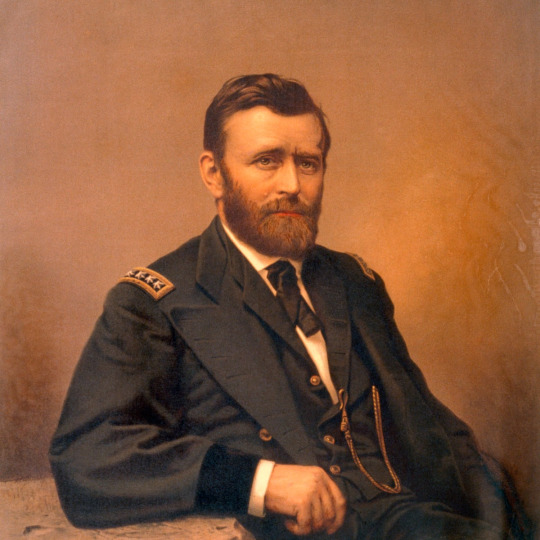
Ulysses S. Grant
Basic Info
b. April 27, 1822 - d. July 23, 1885
From: Point Pleasant, Ohio
Party: Republican
Term: March 4, 1869 - March 4, 1877
Vice President(s): Schuyler Colfax (1869–1873) and Henry Wilson (1873–1875)
With an education from West Point, one prestigious military academy, and experience fighting in the Civil War, it was not surprising to see Ulysses S. Grant come into the position of the 18th president of the United States. His background and familiarity with the issue made him a key candidate and helped push towards progress within the US during a difficult time.
Offices
United States Interim Secretary of War (1867-1868)
Commanding General of the United States Army (1864-1869)
Main Points of Inaugural Speech (Link):
March 4, 1869 (Link)
Grant says that he will do the best of his ability to serve the nation and accept responsibilities without fear. He will execute all laws faithfully, whether they meet his approval or not.
He guarantees that the laws are to govern all citizens. The great rebellion, the Civil War, and the questions that follow it should be dealt without prejudice or sectional pride. This requires security of every individual regardless of religious or political opinion.
He talks about the debt accumulated from the war. Every dollar of Government indebtedness should be paid in gold unless otherwise stated and that a strict treasury policy should be used to account for every dollar. It may be hard since there are many poor states but with aid, the US can succeed.
In terms of natives, foreigners, and foreign policy, he wishes to protect law-abiding citizens. He wishes to respect all people, native or of foreign nationality. He even directly states a proper treatment for the natives and their civilization
He hopes the question of suffrage ends with the ratification of the 15th amendment
March 4, 1873 (Link)
The second inaugural starts with his promise to continue in the same direction of his last 4 years of presidency.
There have been many improvements to the world including the creation of the telegraph and steamboat. Those things have increased the ability to communicate and granted people access to many things not seen before. However, the US still has not dealt with the issue of social equality.
There has been civil strife to free the slave and make him a citizen, but not give him the civil liberties which comes with it. He asks for the people to change it and give the colored man a fair chance to develop "what good is in him"
He reflects upon his consideration and initial want to have Santo Domingo as a territory. Although it was denied constitutionally, he vows t o consider gaining support from the people prior to asking for a new territory to be claimed.
His efforts in the future are going to go towards restoring the "good feelings" of people, restoration of currency, maintenance of friendly relations, and reestablishment of our commerce.
He yet again mentions the Native Tribes and how important it is that they receive proper education before inflicting the pain we have before. He wishes for a more lenient policy.
He ends his speech talking about how he wishes to rectify his wrong and prove the slander pointed against him to be false.
Main Conflicts
Great Sioux War
Foreign policy - concerning Santo Domingo, Cuba, and Hawaii
Gold Standard
Panic of 1873 & recession
Reconstruction & Civil Rights
Media
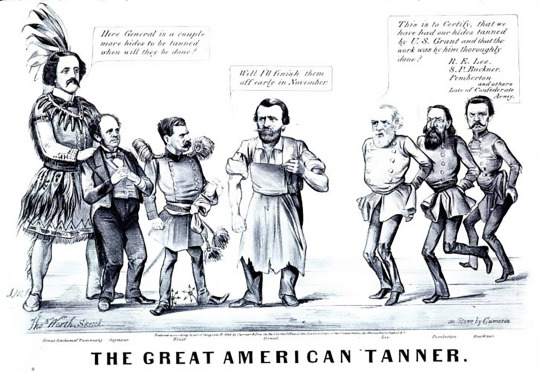
This political cartoon created during the 1868 election shows those defeated by the "Great American Tanner" who was Grant. The joke runs on the fact that his family were Tanners, a job he disliked. (Source: Library of Congress)
Presidential Commentary
Well-educated in the art of war, Grant was a president of great valor. His ability to power through the Civil War and other battles aided him when he ultimately came into his presidency. Being able to empathize with those on both sides, he was able to shape his presidency as one critical to the formation of the nation.
One of the strengths of Grant’s presidency was acknowledgement of what the newly freed slave needed. Being able to illustrate this importance to the people from the beginning of his second term, and making sure that the states understood their importance of working harmoniously together to achieve this, he set the stage to create the 15th amendment. This was important to establish the voting rights for all races. Although states found ways to continue interfering with voting rights of all people by creating the grandfather clause and the writing tests, the 15th amendment was eventually protected and guaranteed to all races, nationalities, ethnicities, and genders. If Grant purposely ignored the importance of the right to vote or the importance it had to those who were newly free, there is no telling what would have happened in protection of citizen’s rights. Another accomplishment stemming from this fact was the appointment of Black-Americans in the US Congress (Britannica).
Alongside his advocacy of newly freed slaves and the improvement for their lives came the importance of the tribes during this time. In fact, from the beginning of his presidency he advocates for their rights as well. He promises to support them in any case that tends to their civilization and the ultimate citizenship, as well as proper treatment to them. His first term reflected it. However, by the end of the second term his stance had changed, and he ended up killing the bison that was so important to the Plains Native Americans lifestyle (Miller Center).
Unfortunately, no human is free from error and there were weaknesses in the presidency of Grant. There was plenty of corruption that occurred within the years of his term. First, the gold standard policies concerning the currency and trying to prevent further debt caused problems since many people were greedy. This also came into connection to his ignorance of finance policy. Ultimately his choices led the country to the Panic of 1873. There were many instances of corruption throughout the government and it was most likely because the country was growing in prosperity after the Civil War. If Grant had hired or found an individual with expertise in finance, perhaps the recession would not have happened or lasted shorter. Yet, this cannot be told and only be used to reflect future fiscal policy.
In conclusion, the presidency of Grant was not one that should be remembered only for its major faults but also for its major accomplishments. His ability to use progressive language and support the passing of legislature that in the end advanced those who were freed contributed greatly to the on-going civil rights movement in the US. As a matter of fact, it should be seen as a lesson to all that no human is perfect but there is a bright side to every problem.
Citations/Links:
https://millercenter.org/president/grant
https://www.britannica.com/biography/Ulysses-S-Grant
https://www.pbs.org/wgbh/americanexperience/features/grant-gallery/
https://www.britannica.com/topic/Radical-Reconstruction
https://millercenter.org/president/grant
0 notes
Text
Andrew Johnson
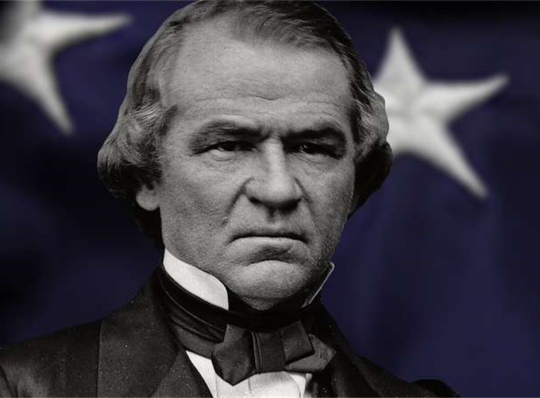
Andrew Johnson
Basic Info
b. December 19, 1808 - d. July 31, 1875
Term: April 15, 1865 - March 4, 1869
Party: Democrat
From: Born in North Carolina, active in Tennessee
As the embodiment of the saying "anyone can be president" in the US, Johnson's presidency started off like that of Tyler and Filmore, and later on Lyndon B. Johnson would follow the steps of ascension like these vice presidents. The actions of Johnson's presidency shown through the major conflicts prove what he shaped the country to be after the Civil War.
Political Offices
US House of Representatives - Tennessee (1843-1853)
Governor of Tennessee (1853-1857)
Military Governor of Tennessee (1862 - 1865)
Vice President (March 4, 1865 - April 15, 1865)
US Senator of Tennessee (March 4, 1875 - July 31, 1875)
Main Points of Inaugural Speech (Link):
Main Conflicts
Reconstruction
Industrial Revolution
Civil Rights Act of 1866
14th Amendment
Impeachment
Media
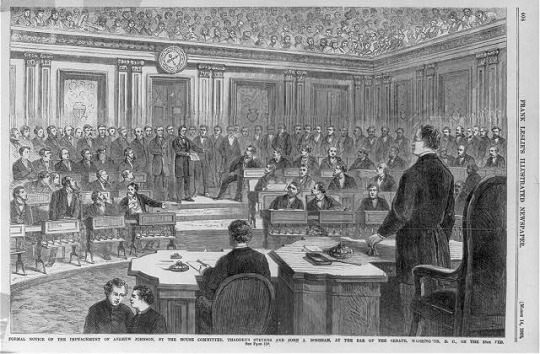
A wood engraving depicting the House and it's official notice of the Impeachment of Andrew Johnson. Library of Congress. March 14, 1868.
Presidential Commentary
Once again, the United States filled its executive branch with the ascension of a vice president due to the death of the president. In this case the first assassination happened against Abraham Lincoln which ultimately change the course of what the nation looked like after the Civil War. There were many aspects of Johnson’s presidency that clashed with the ideal many had post-Civil War and ended up labeling him as one of the worst presidents of US History.
The first major issue that showed weakness in Andrew Johnson‘s presidency was the fact that he “handed out thousands of pardons in almost routine fashion” which caused many to wonder what kind of punishment those in the south deserved (Miller Center). The failure to stick through the beginning of the reconstruction era with a strict plan to deal with what the south did reflected later on when the Republicans wish to engage in creation of equality laws for African-Americans. Had Johnson been stricter with the rules of which individuals should be pardoned and which should be punished, perhaps there would have been more push towards giving those Freedmen more freedoms and rights. This way the conflicts in the government would not have been as extensive. It would have pushed towards more equalizing legislature and changed the lives of many people.
Another issue of Andrew Johnson was his inability to work with the Congress of his term. Most people thought that he would agree with the notions of the Republican party as he was the Vice President of a Republican president. However, he let his racism get the better of him, saying that if the Freedmen’s Bureau was passed then the “blacks” would spend their lives living in wasteful laziness (Miller Center). Many of the rights of the blacks that would have probably passed through Lincoln were nearly impossible for those in Johnson’s time. He also became impossible to work with, vetoing acts and laws that made him a target of impeachment. This is not a surprise but seems to be a consequence of his actions and his inability to serve as an adequate president. Those before him knew the importance of compromise and rationality but he let his personal feelings get the better of him.
No matter how rough the presidency of Andrew Johnson started off, it did not end any better for him. As he was the first president to be impeached, the many actions of Andrew Johnson led to his downfall and the consequential inability to get a second term as well as many other issues that went alongside this. Although there is proof that Andrew Johnson freed the slaves that he once held, the actions of not allowing the freedmen to have the same rights as the “white Americans” caused much controversy and fighting against the acts to support them, he proved that he was incapable of being a president who sought the better for all of the people (Britannica). It is only a surprise that the Senate failed to convict him after months of bitter arguments of legislation. The lesson to be learned from Johnson is to be more open-minded as president.
Citations/Links:
https://www.loc.gov/item/2002697737/
https://www.britannica.com/biography/Andrew-Johnson
https://millercenter.org/president/johnson/domestic-affairs
0 notes
Text
Abraham Lincoln
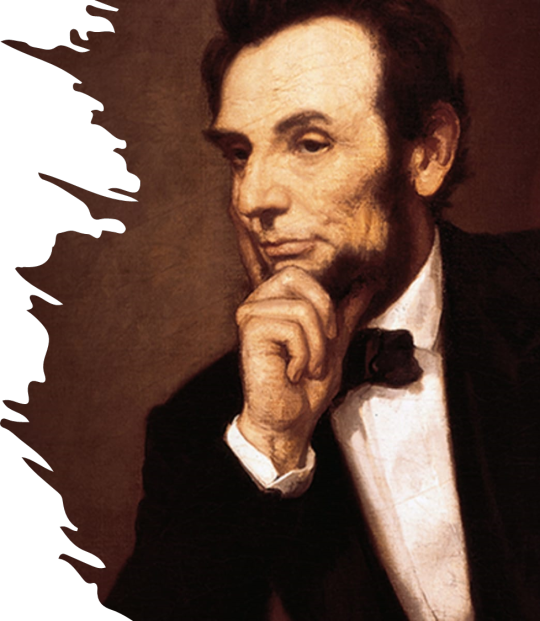
Abraham Lincoln
Basic Info
b. February 9, 1809 - d. April 15, 1865
Term: March 4, 1861 - April 15, 1865
From: Illinois primarily but was born in Kentucky
VP: Hannibal Hamlin (1861 - 1865) & Andrew Johnson (1865)
Known for signing the Emancipation Proclamation and his legendary Gettysburg Address, the representative of Illinois was able to set many precedents in his presidency and put a final end to the issue of slavery in the United States. Although he was never able to see the final outcome of the war, due to his assassination early on in his second term, his presidency was the birth of a new era that many people never thought would come.
Political Offices Held
Illinois House of Representatives (1834-1842)
US House of Representatives - Illinois (1847-1849)
Main Points of Inaugural Speeches
March 4, 1861 (Link)
Lincoln makes it clear that the issue of what he might do as president is not something to worry too much about. This is because the south think that their property and peace and personal security are at risk, but they are not.
Lincoln states to gave no purpose directly or indirectly to interfere with the institution of slavery in the sates where it exits. He believes he has no lawful right to do so, and is not inclined to do so
Resolved that the maintenance inviolate of the rights of the States, and especially the right of each state to order and control its own institutions according to its own judgement.
Perpetuity of Union is mentioned, and it is implied in the fundamental law of all national government. The fact that the Confederacy is happening shows that they are rising an insurrection. He warns that there might be bloodshed or violence, but there shall be none unless it be forced upon the national authority
He tells the people to think long and hard about their position about leaving the Union, keeping slavery around, and what it might do the foundation of many important aspects of the nation. This includes travel, trade, commerce, and other issues
Nothing valuable can be lost by taking time.
March 4, 1865 (Link)
This speech was shorter than the previous one, which followed traditions of other presidents reelected.
Lincoln had transitioned into a God-fearing man. He mentions how if American slavery is one of the offenses which God wants to come to an end, he hopes that the Civil War will quickly pass and its troubles with it.
Lincoln makes it clear that his signing of the Emancipation Proclamation was due to his devotion to saving the Union without War. It was the insurgent agents that were seeking to destroy. The only option after this long of a debate on one topic was doomed to end in war.
He himself says that “The slaves constituted a peculiar and powerful interest. All knew that this interest was somehow the cause of the war” which ended the notion that the Civil War was not about slaves.
Main Conflicts
The Civil War
Emancipation Proclamation
Start of Reconstruction
Implementation of the 13th Amendment
Native Americans & Dakota Uprising
Media
youtube
CrashCourse video about the events leading up to the Civil War, Abraham Lincoln, and the election of 1860. (Youtube. 2013).
Presidential Commentary
Revered as one of the greatest presidents, Abraham Lincoln set many precedents never seen before. president Lincoln was a experienced lawyer and politician that helped paved the new Republican Party as well as the president of what to do during a war where the issue may seem impossible to settle.
One of the strengths of Abraham Lincoln was his ability to be flexible. this ability was imperative to the outcome of the civil war. Beginning his presidency, he was a moderate that had no intentions to end slavery in the states that already held it in their constitution. He even warns the people to think long and hard as “nothing valuable can be lost by taking time” (Avalon). This mindset showed important when he eventually signed the Emancipation Proclamation which freed the slaves and ended slavery in the United States. By being willing to change his stance and seeing what it meant to keep slavery in the nation that had wished it to be over, he was able to preserve the Union or at least tie it back together. Although many lives were lost and changed, the end to the issue of slavery served good in many ways. This included the Industrial Revolution, the growth of transportation, and rights for the freed slaves (Miller Center). Learning from this flexibility, future presidents can use the history of this time to make future decisions. Learning from the message in his inaugural, anyone can use it to reflect on the decisions that they make.
One of the weaknesses of Lincoln’s presidency was his finding of the right generals to fight the war (Miller Center). His impatience cost him many battles and the impossible nature of knowing the future outcome could make any president anxious with decisions. Eventually, the General Ulysses S. Grant was chosen and with his background, the Civil War was won by the Union Army. Although Lincoln turned out lucky with his finding of this general, that is not always the case. It should be noted that the tactic shown by Lincoln during this war was not one that many people choose and should not be chosen as a precaution. It is not ideal to switch up the reigning general of your army often, but it turned out to work for the Civil War.
After the Civil War concluded, Lincoln gave his final speeches and helped to start the process of the 13thamendment as well as Reconstruction. Many were tired from the war and still angry. The defeat left anger in the heart of John Wilkes Booth; the assassin charged with the murder of Abraham Lincoln. Even his death left a rippling impact on the nation. In fact, his funeral and death arrangements left a precedent of a proper funeral which has stuck around and was the reason why the price of funerals increased. It is clear that in both life and death, President Lincoln serves to be an icon to the people. It should be remembered that although he did end the war with the Emancipation Proclamation, it was not his intention to end slavery but as he swore to do, he did what he had to do to preserve, protect, and defend the people and the nation.
Citations/Links:
https://avalon.law.yale.edu/19th_century/lincoln2.asp
https://avalon.law.yale.edu/19th_century/lincoln1.asp
https://www.whitehouse.gov/about-the-white-house/presidents/abraham-lincoln/
https://www.britannica.com/biography/Abraham-Lincoln
https://millercenter.org/president/lincoln
1 note
·
View note
Text
James Buchanan
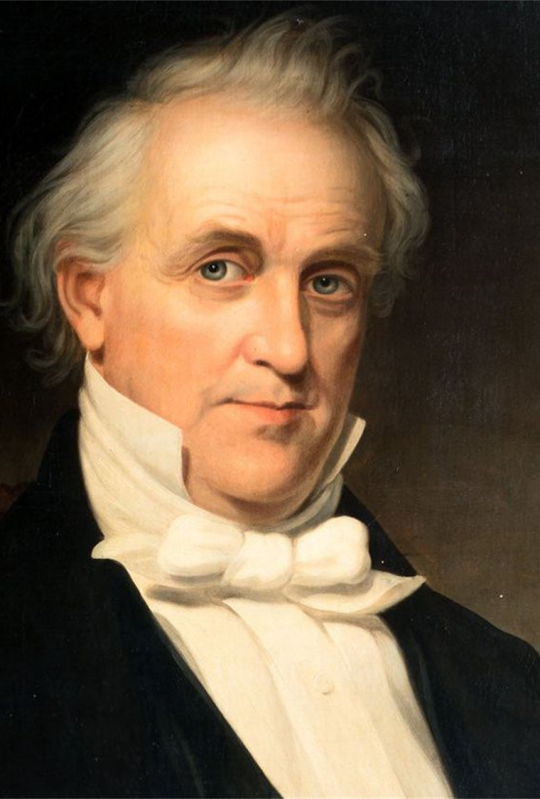
James Buchanan
Basic Info
b. April 23, 1791 - d. June 1, 1868
Term: March 4, 1857 - March 4, 1861
VP: John C. Beckinridge
Party: Democrat
From: Cove Gap, PA
With his illustrious record of politics and his well-to-do family background, Buchanan came at a time of turmoil into his presidency. With the country falling apart from the previous president's mistakes, Buchanan was charged with the responsibility of trying to pull the Union together before it broke out into what was known as the Civil War.
Political Offices Held
Pennsylvania House of Representatives (1814-1816)
Representative, 3rd and 4th District PA (1821 - 1831)
US Minister to Russia (1832-1833)
US Senator of Pennsylvania (1834-1845)
US Secretary of State (1845-1849)
US Ambassador to the UK (1853-1856)
Main Points of Inaugural Speech (Link):
Buchanan starts off his speech thanking for his nomination and promising to preserve, protect, and defend the nation to the best of his ability. He outlines the ability to be president towards the love he has for the Constitution and makes it clear he will not serve a second term.
He mentions the difference of opinion concerning the Territory of Kansas and says that it is a “matter of but little practical importance” and the Supreme Court must deal with the question. Buchanan makes it clear that the duty of the government to secure every resident’s right to freely vote and that it is fairer for the people of the Territory to decide their own destiny. He is very dismissive about an important case that will change the fate of the country.
Buchanan goes on to mention free trade. This is important to binding the nation together. By getting rid of this, it destroys the prosperity of the whole and every part in one common ruin.
In other important issues he states that there is importance of keeping the government free from corruption, which money might be the root of. He wishes to increase the Navy, as it is presently inadequate to protect the nation. Going along with this, he mentions how the Congress should give protection to the territories and now just states. Finally, he says no more revenue should be collected from the people. The tariffs have been collected and now it ought to decrease.
He mentions the importance of emigrants in the nation. He talks fondly about them and how they were able to assimilate and contribute to the expansion of the nation. On the hand of foreign policy, Buchanan talks about staying out of other nation’s domestic affairs unless it deals with self-preservation.
Main Conflicts
Dred Scott Case
Slavery in new states
Federal Government Stalemates
Media
youtube
A video about James Buchanan's life and his presidency (FreedomProject Media - 2014).
Presidential Commentary
The background of James Buchanan is filled with over a decade of political experience. His many positions included being a political figure at home and abroad. Although he was skilled and well-educated, many of his decisions did not reflect that kind of background. Issues that landed on his desk surrounded mostly around the issues of slavery, state’s rights, and the new territories that were yet to be dealt with. Known for being the bachelor of the White House, he let many people down as he was the choice that was made to correct the many mistakes Pierce made.
One of the main issues of Buchanan is his dismissive nature. This can be seen as early as his inauguration ceremony. His dismissive tendencies of the slavery issue and the territories that wish to be admitted into the United States caused his eventual downfall. At a time where tensions were high, the ideal response is not to say that the issue is “of but little practical importance” while constituents are living in a place that is stuck with the name of “Bleeding Kansas” because of it. This nature also reflected in his work towards dealing with the major issues of his presidency. More importantly, his attempt to win over the support of proslavery democrats reflected poorly upon his attempt to be neutral (Miller Center). He was no longer being the man that believed that it was a little issue. Eventually, Kansas was accepted as a free state but this decision to back up a new slave state set the tone of his presidency.
The issues stemming from Buchanan’s inability to deal with the territory issues eventually left the prelude of the Civil War. His total presidency was ruined with national violence about an issue that the country had been fighting so hard to avoid. With the pop up of people like John Brown, an abolitionist leader that had fought against those with proslavery sentiments, and future Confederate General Robert E. Lee, it was clear that the true war was about to begin (Miller Center). Defeated, the only thing that seemed appropriate for Buchanan to do is to sit back and wait out his term. In retrospect, after a certain point people who are tired of fighting about the same issue repeatedly end up turning to war as a last resort.
Perhaps the Civil War can be argued as something that was inevitable as slavery and states rights over them continued to be a main source of aggression since the inauguration of George Washington. It is not to say that it was not at all Buchanan’s fault for the prelude to war, because it is evident that his downplay of the issue led to the eventual first steps of violence. It was just his fault for being ineffective at dealing with the issue and therefore becoming the president before the Civil War began. It might be wise to learn from his mistakes both as citizens and future voters that those who downplay important issues like this often end up in situations where they regret it.
Citations/Links:
https://millercenter.org/the-presidency/presidential-speeches/march-4-1857-inaugural-address
https://www.youtube.com/watch?v=Kwd_f4AAo4U
https://www.whitehouse.gov/about-the-white-house/presidents/james-buchanan/
0 notes
Text
Franklin Pierce
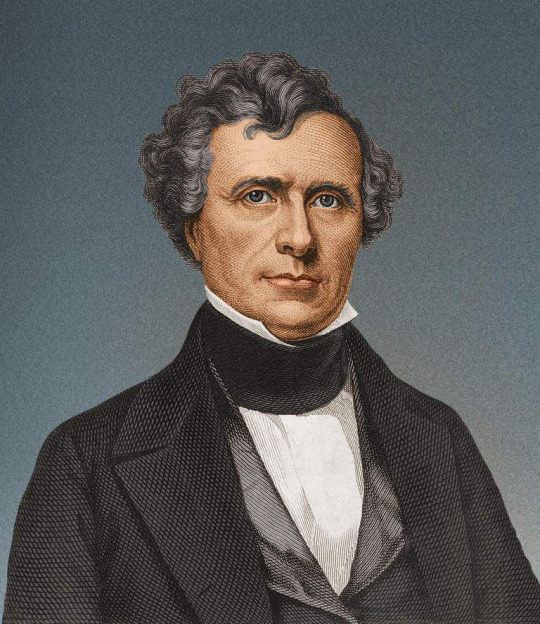
Franklin Pierce
Basic Info
b. November 23, 1804 - d. October 8, 1869
From: Hillsboro, NH
VP: William R. King
Party: Democratic Party
Term: March 4, 1853 – March 4, 1857
As a northern Democrat from New Hampshire, Franklin Pierce fiercely opposed the abolitionist movement as it seemed to be a threat to the sanctity of the Union to him. With his experience in politics of over a decade, his study of law, and even experience in the military as a soldier, Pierce set his principles clear in his inaugural address and the actions of his presidency.
Political Offices
Town Meeting Moderator (1829-1836)
Member of the New Hampshire House of Representatives (January 7, 1829 – January 2, 1833)
Speaker of the New Hampshire House of Representatives (1831-1833)
US House of Representatives (March 4, 1833 – March 3, 1837)
US Senator (March 4, 1837 – February 28, 1842)
Main Points of Inaugural Speech (Link):
•Pierce makes it clear that the post assigned to him was not to as one sought but in obedience to the expression of the people’s will.
•The Republic has focused on the unparalleled progression in territory, population, and wealth which has been the talk of all nations. The Constitution was upheld by a broad and intelligent comprehension of rights and a purpose to maintain them, stronger than armaments.
•The Founding Fathers made the Constitution that had exhibited the power to achieve and the capacity to maintain the rights and freedoms of the people. Our country has fulfilled its highest duty to those who suffer and speaks the language of sympathy, encouragement and hope. The Founding Fathers decided for themselves the eternal principals of rights and justice which are pricelessly inherited by us.
•The apprehension of dangers of expanded territory, multiplied states, accumulated health, and growth in population. The compatibility with the states and federal government has afforded a guarantee of strength and integrity.
•My administration with not be controlled by any foreboding of evil from expansion. Should any be obtained, it will be dealt with the strictest observance of national fate. I intend to have a fair administration and wish to give assurance that no act within the legitimate scope of my constitutional control will be tolerated on the part of any portion of our citizens which cannot be challenged by a ready justification.
•If your past is limited your future is boundless.
•If we should open new channels of trade and create additional facilities for friendly intercourse, the benefits will be equal and mutual. Any complicated European systems that come our way will not affect us except for the appeal to our sympathies.
•The right which belong to us as a nation are not alone to those who live at home but those abroad and pertain to every citizen and his individual capacity. It is hardly necessary to reaffirm a principal which should be seen as fundamental.
•From my experience as a soldier, I see that the maintenance of a large army is dangerous and unnecessary. Although an army should be well disciplined and efficiently organized the nation will have to deal with this later and I will look towards the advice from people of the branches of government which I respect.
•Pierce acknowledges the obligations to the masses of his countrymen and to them alone. He believes that if the Federal Government continues to confine itself to the exercise of powers clearly granted through the Constitution, then it can’t endanger the rights of the states.
•His stance on the issue of slavery, although indirectly stated, is that the Union depends on it being alive. Without Union what are the people individually or collectively If a single star is lost, the luster of the whole is dimmed, meaning to lose one state is to lose a vital component of the Union.
•He holds the Compromise of 1950 to be constitutional and to be unhesitatingly carried into effect. He believes that the authorities of the Republic are bound to regard the rights of the South in the respect of slave rights as any other right.
Main Conflicts
The Kansas-Nebraska Act
Attempt to acquire Cuba from Spain
Creation of a Western Railroad
Media
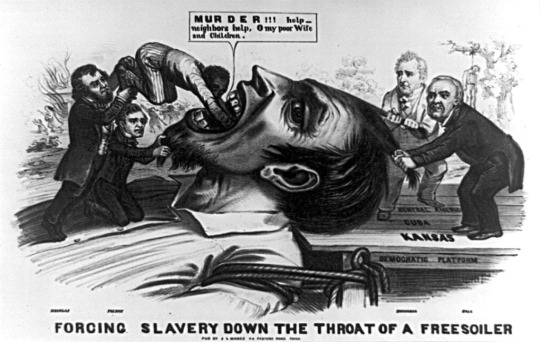
In retaliation of the Kansas-Nebraska Act, the northerners depicted the act as forceful and created this cartoon to display their anger. (LOC, by John L. McGee published in 1856).
Presidential Commentary
The presidency of Pierce was yet another “dark horse” presidency that seemed to be the outcome of the destruction of the Whig Party. As the party disintegrated over the issues of slavery and sectionalism, the democrat from New Hampshire won the election in a landslide. However, many historians call his presidency forgettable and many of his policies did anything but help with the issues at the time.
One of the policies that helped to accelerate the Civil War’s occurrence was the issue of the Kansas-Nebraska act. This act wreaked havoc upon the nation. It caused many to feel betrayal since it overturned the Missouri Compromise, an issue that was once faced with threats of secession from the Union. It also ruined the work of the previous president Millard Filmore and his Compromise of 1850 which seemed to work. The idea of popular sovereignty was brought up as well as letting the Supreme Courts make their decisions. In the end, the president signed the act that let the Missouri Compromise of 1820 be overturned. Allowing this fate tore the country apart and Pierce found himself a pawn in a chess game of other congressional members. If the president listened to his gut, perhaps he would have won a second term and not have led the nation into chaos. As a result of this, the term “Bleeding Kansas” existed because of the non-stop bloodshed between abolitionists and those pro-slavery.
Although President Pierce had a rough start, with the death of his son so close to the inauguration and beginning of his term as well as his recorded drinking problems, not all bad things happened throughout his presidency. One of the strengths of Pierce’s presidency was the Gadsden Purchase which included the final parts of Arizona and part of New Mexico. This left its impact on how the map looked like afterwards and since then, the US has looked the same in terms of borders. By adopting this region, it allowed more resources for the nation such as minerals and agriculture, an increase for the population, and the ability to complete a railroad that would change trade route and the markets of the US.
Reflecting on Pierce, and by seeing how many people cannot recall his name in the list of presidents, it is clear that his presidency was what the people of the time saw it; ineffective. His inability to prevent the violence and bloodshed in Kansas, unwillingness to stand by his gut, and his inability to find balance to please both sides of the argument led to the eventual Civil War.
Citations/Links:
https://avalon.law.yale.edu/19th_century/pierce.asp
http://loc.gov/pictures/resource/cph.3b38367/
https://www.whitehouse.gov/about-the-white-house/presidents/franklin-pierce/
https://www.britannica.com/biography/Franklin-Pierce
0 notes
Text
Millard Filmore
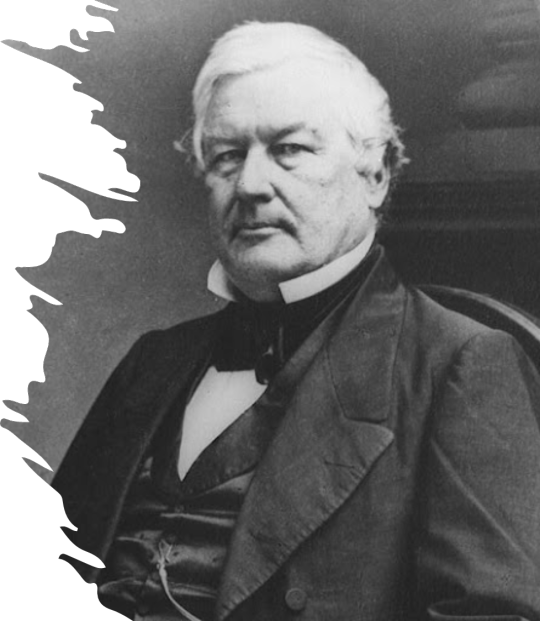
Millard Filmore
Basic Info
b. January 7, 1800 – d. March 8, 1874
Term: July 9, 1850 – March 4, 1853
Party: Whig
VP: None
From: Moravia, New York
While growing up in poverty and much moving throughout his childhood, Filmore found his success in becoming a lawyer which ultimately led him in becoming a politician for the state of New York. His rank of Major in the New York Militia also allowed him to relate to the sentiments that his predecessor held. Unexpectedly becoming the president led Filmore to transition back to the political ways and the Whig Party goals.
Main Points of First Annual Speech (Link):
** Filmore has no record of giving an Inaugural Speech**
Filmore mentions the passing of late President Taylor, his grief from the sudden loss, and the unexpectedness of being the new acting Chief of State.
The nation has certain rights and owes certain duties to its citizens and other nations in the world. The duty of happiness is claimed by the people of the United States. Therefore, it is imperative that the US do not interfere in the government or internal policies of other nations. It is more beneficial to take a strict neutrality in foreign wars to make sure the US has friendly relations with all.
He will use the Constitution as his guide and he will turn to it for the interpretations of important events.
He promises to be frank with his opinions and that any unconstitutional act or an act that encroaches upon the just powers of other departments will be dealt with.
There are many duties and powers of the president, one of which being the appointing power. It is to be regard with sacred trust and be exercise with the sole point of advancing the nation and happiness of the people
He mentions the relations of the US and Nicaragua and the difficulties of foreign relations with them, but assures that all is well. The issue of the two oceans (Atlantic and Pacific) connecting will soon be agreed upon and a project of a railroad is on the horizon.
He makes sure that a high tariff will never be permanent because it will cause unhappiness and it will have to be changed.
More than 3/4ths of the nation's population is involved with farming and the interests of the nation depend on the agricultural field. He recommends an agricultural bureau to overlook any issues because the fields of commerce and manufacturing are dependent on them.
He mentions the issues of the Indian Tribe Nations and the relation to the US, which are inherently tied to the annexation of Texas and the states of California & New Mexico. He calls them a source of "constant terror" and "annoyance" to the inhabitants.
The Navy requires the immediate consideration of Congress to revise the code for the system of crimes and punishments. A new system of discipline is needed.
Our liberties, religious and civil, have been maintained.
Main Conflicts
Fugitive Slave Act
Relations with Japan & Protecting Hawaii
Cuba & Spain: the attempt of overthrowing Spanish Colonialism
Eastern Europe and indirect US Support
Media
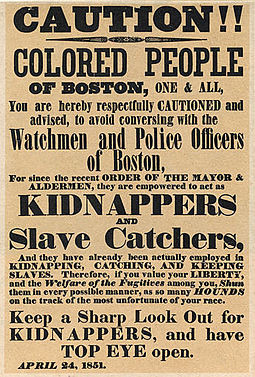
Above is a poster warning about slave catchers and kidnappers that help to return fugitive slaves to the south. April 24, 1851. Newsela / Library of Congress.
Presidential Commentary
Although the presidency of Millard Filmore was an unexpected one, he was more than prepared to deal with what it took to be the president. His experience with both politics and the military made him a seasoned individual and ensured that he would do his best to preserve the nation. His presidency was one of the last of those that sided with the Whig party and left a lasting impression in terms of domestic and foreign policy.
One of the strengths of his presidency was his ability to transition quickly. Although he did not retain cabinet members, he was able to replace them and continue with success. This was characterized by his many foreign policies and expeditions. First, there was the interaction with Japan. At this time in history Japan was very isolated from the world. There was not much to know about the nation and not many imports into the island from the outside world without heavy screening. Understanding this, it was a very surprising matter when William Perry was able to communicate and start the trading that continues to this day. Alternatively, the ability for Filmore to stay out of the conflict within Eastern Europe while also commenting his approval of what the Hungarians were doing is a sign of him executing what he mentioned in the first annual speech. He aimed to keep the US out of war and did so with Europe and the Caribbean matter when the Spanish slave colony of Cuba tried to overthrow its government. All of these issues were dealt with in a peaceful manner on the US side of the matter and prevented any further war debt from being accumulated.
On the other side of policy, there was the passage of the Fugitive Slave Act which sparked controversy and problems all over the United States. Although he did end the slave trade in the District of Colombia and helped admit the state of California as a free one, this measure was one of the reasons why the Civil War began. As more people were rallying against the free statehood of California, this was used as a technique to settle people down and seem fair in its admittance. However, it made many people angry and encroached on the rights of freedmen as many people who were slave catchers captured, tortured and sold them back into slavery or subjected them into slavery even when they were born free. Without the freedman having his record of being freed or being born free, there was no way to prove his freedom therefore subjecting him to a possible lifetime of slavery. Without the due process of the law for these individuals, this weakness of the Fugitive Slave Act turned into a nightmare for many people.
Although many people did not expect for Filmore to become president since his predecessor was known for being strong, it is not a surprise how his presidency turned out to be. His guarantees to protect those and rectify the issues of the US were both carried out and his presidency led to many victories but also one huge defeat for those abolitionists and subjects of the Fugitive Slave Acts. With this mind, it is clear to see that his presidency was one that shaped the possibility of the Civil War.
Citations/Links:
https://millercenter.org/the-presidency/presidential-speeches/december-2-1850-first-annual-message
https://www.whitehouse.gov/about-the-white-house/presidents/millard-fillmore/
0 notes
Text
Zachary Taylor
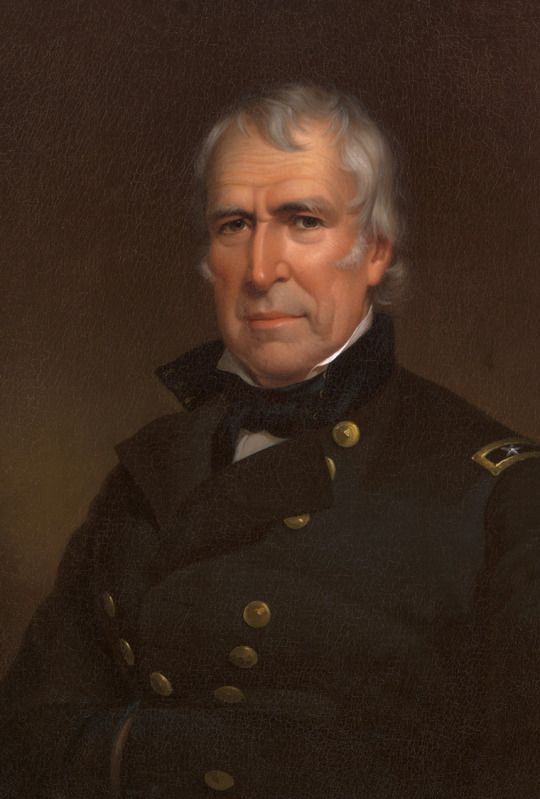
Zachary Taylor
Basic Info
Born: November 24, 1784, Barboursville, VA
Died: July 9, 1850, Washington, D.C.
Party: Whig Party
Presidential term: March 4, 1849 – July 9, 1850
Vice president: Millard Fillmore (1849–1850)
Prior to his term, he was a General, which can be seen in the writing of the Inaugural speech, and helped lead the nation through many victories - most significantly the Mexican-American War. Although the concept of a president dying within his term was no longer an unseen precedent, the death of Zachary Taylor changed the predicted term of his presidency.
Main Points of Inaugural Address (Link)
In this short speech, Taylor starts of talking about the aids that are given to the Executive office and how it will allow him to do whatever is right to execute his duties, diligently, impartially, and with the best interest of the people.
He swears to preserve, protect, and defend the nation as the Constitution as his guide while following the judgements of the earlier presidents.
As elected under the notion that he would be devoted to the welfare, he reiterated the promises to maintain the government in its original purity.
He mentions the importance of foreign relations and how they are essential to the best interest and true honor of the country.
Main Conflicts
Sectional debate & Slavery
Popular Sovereignty
Immediate Admittance of California and New Mexico
Compromise of 1850
Fugitive Slave Act
Media
In this video from Britannica, it encases the life story of this president and how he was able to persuade people to vote for and trust him.
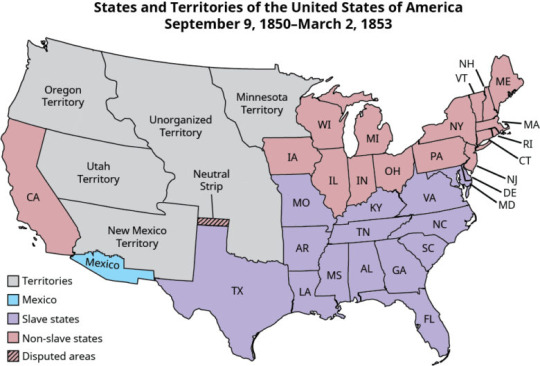
This map is the map drawn up of the United States after the Compromise of 1850 is reached and passed. credit: modification of “United States 1849-1850” by “Golbez”/Wikimedia Commons, CC BY 3.0)
Presidential Commentary
With strong ties and background concerning the military as it had been both the career of Zachary Taylor and his father, his inexperience with politics made the presidency different than those previous. Although there were many who doubted his success because of his inexperience, the presidency was one that led to many of the important acts and notions to keep the nation united and prevent a civil war.
One of the strengths of Taylor’s presidency was his campaign trail and ideologies. The fact that the nation had only ever had politicians winning behind the ticket changed when Taylor was elected. His notion of not being a politician and not having so many political beliefs proved beneficial after he was elected. This strategy helped convince the people to vote for him and it can be a strength as he gained the trust of people not because of certain acts or things he believed in, but because he was for the people and for the preservation of the Constitution.
Another strength of Taylor was his push to admit the states of New Mexico and California almost immediately, skipping the territorial phase that previous states were guided to do. As many other presidents dealt with the issue of new states, Taylor was unique in this way of dealing with the Sectional Crisis. This angered many people, but it was a great tactic to decrease the possibility of California being a slave state. Although he was not alive to see his impact, the fact that California was able to be a free state and the Congress of the time were able to pass the Compromise of 1850 was mostly because of him. It was truly a move ahead of its time and it had the possibility of starting another war, he was willing to do whatever it took to preserve the nation.
A weakness of Taylor stemmed from the fact that although he was a decent president in retrospect, his inexperience of politics caused a rift between him and the others that he needed to work with. The distance between the Executive and Legislative branch was no where near what it was during John Tyler’s presidency, but nevertheless it impeded on some of the acts that people wished to pass. Another weakness was the Cabinet relations that Taylor had. This stems from the Galphin affair in which his Secretary of War George Crawford was found stealing funds from the government. If it weren’t for his distance from those in Congress and his Cabinet, he might have been able to find out the funneling of funds earlier and excuse himself from the embarrassment.
In many ways, Taylor was a strong president. His ability to do as he said in his speech, to protect, preserve, and defend the nation in the original ways the Founding Fathers intended, was shown through his strong “non-political” nature. However, his distancing from others cost him some of his presidency. The question that keeps being asked while reflecting on him is if he would have lived, would he have had a second term? And if he did, what would have US history turn out to be?
Citations/Links:
https://avalon.law.yale.edu/19th_century/taylor.asp
https://www.britannica.com/video/172707/overview-Zachary-Taylor
https://billofrightsinstitute.org/essays/the-compromise-of-1850
0 notes
Text
James K. Polk
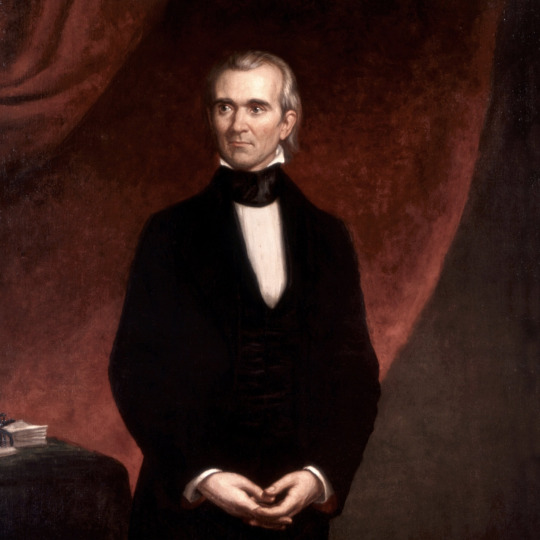
James K. Polk
Basic Info
b. November 2, 1795 - d. June 15, 1849
Term: March 4, 1845 – March 4, 1849
Party: Democratic
VP: George M. Dallas
From: Mecklenburg County, North Carolina
Known for being called the “dark horse” president, the ideals that Polk campaigned with as well as the years of experience in law and politics made him unique to the election of 1844. He was once Governor of Texas and even Speaker of the House during Andrew Jackson’s presidency. Unbeknownst to the public, he was the last Jacksonian president and the influence of Jackson helped him with the expansionist policies which helped with the capture of Texas, California, and Hawaii.
Main Points of Inaugural (Link)
To preserve slavery must be religiously observed or else it will lead to the most ruinous and disastrous consequences. This was a core democratic viewpoint through the Civil War.
Abolitionists are dangerous, and their work can lead to the dissolution of our happiness and union. We must preserve slavery in order preserve the principles of the Constitution which the Founding Fathers created to unite and protect us all.
Need no national banks or extra institutions around the government because they cause more problems than good.
Each state is a complete sovereignty within the sphere of its reserved powers. The Federal government is also a complete sovereignty. Each of these governments should stay within their limits and respect the boundaries already created for them.
In terms of foreign affairs and foreigners, these policies have no reform on the States and all those who live upon American soil, native or foreign, of every shade of opinion, are protected with the laws created in the United States. Minorities have a right to appeal to the constitution as a shield against those who are encroaching upon their rights.
Although our government is not perfect, it is a success. To preserve it the compromises which helped the Founding Fathers form the Constitution must be sacredly and religiously observed. Otherwise, everything will be ruined and come with the worst consequences.
Polk intends to have a strict economy that goes with public interest. The national debt has grown rapidly and it is due to unnecessary spending. The nation needs adjustment of revenue laws and the levy of taxes necessary for the support of Government.
The power “to lay and collect taxes, duties, imposts, and excises” is indispensable to the Federal Government and without it, there would be no means of providing support to the nation. Our citizens will submit to the payment of taxes as needed, during peace or war.
Polk mentions the welcoming of Texas and looks forward to its decision to enter the Union and the importance of Texas’ resources to the nation. His mention about the foreign nations having no right to interfere with them stems from the ideals of the Monroe Doctrine. This also applies to Oregon.
All officers are expected to preform a strict duty of "care that the laws be faithfully executed" or else they will be terminated.
Main Conflicts

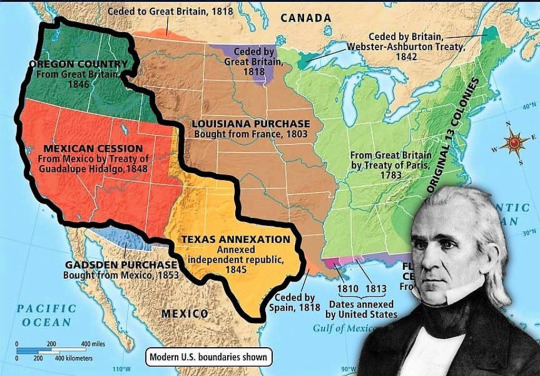
The map above shows the growth of US geography over the course of John K. Polk's presidency.

Media
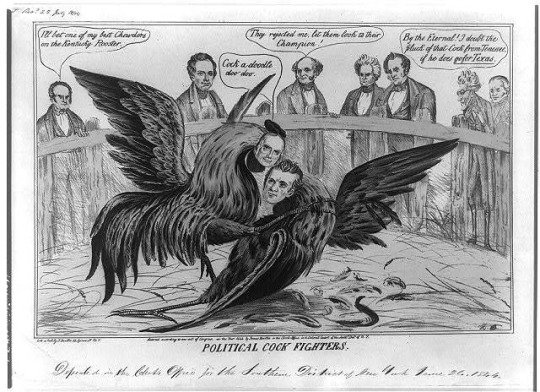
Political Cock Fighters by James Baillie in 1844. This is a political cartoon depicting the fights between Henry Clay and James Polk during the 1844 election as important figures of the current and past make remarks about the waning Polk bird. It is archived in the Library of Congress.
Presidential Commentary
The beginning of Polk’s presidency began with negative comments from the Whigs but he proved to them his real strengths after winning the Mexican-American War, expanding the US to have easy access to the Pacific Ocean, and settling the issues with the US-Canadian border once and for all.
There were plenty of strengths within the presidency of James Polk. First, the strength of having the courage to assert his stance on the Texas annexation issue while both Clay and Van Buren tried to avoid speaking about it. Taking advice from his mentor, Jackson was able to help Polk secure the presidency by encouraging the use of expansionist rhetoric and ideology. Instead of hiding behind the curtain about his wishes, he asserted them even in his inaugural speech. This assertion and dare to be different led him in his success of settling the border of Oregon as well as the acquisition of California (which later proved to be a very valuable state in terms of gold), and finally the acquisition of Texas which later became a state in the Union. Without his tenacity, the issue of Texas would have not been addressed and the issue of whether the United States should go after it to claim the very precious and fertile land would have continued. It also influenced the future acquisition of territories. Future events like the Gold Rush and the transcontinental railroad would not have occurred either. These events were able to shape the demographics of the US and changed the economy tremendously as well as the living standard. Without this trait, the US would have looked completely different.
Another strength of this president was his re-establishment of the independent US treasury system. Although there were many that tried to prevent the independent treasury, his presidency was the one that reopened it until the early 20th century. In other terms of financial and economic policies, his care for the reduction of tariff rates helped him gain popularity and showed his truth in what he promised to do in his campaign. The strength of making sure the treasury opened and doing what he said he would do made him a great president for the people.
Yet, there are weaknesses that are seen throughout Polk’s presidency. The first being starting another war which all people wish to avoid if not necessary. His first weakness was bringing in Gen. Zachary Taylor to “pressure” the Mexican people. Unsurprisingly, the Mexicans took this as an indirect declaration of war and attacked the troops. This could have been avoided if the president did not use these troops to “pressure” the Mexican government into selling the land. Although it could have been worse, since the US could have also been fighting the British over land near Oregon at the same time, it was still a conflict that weakened the nation’s trust in him and increased the debt he promised to get rid of in his speech. The $15 million dollar price tag did serve well to the people as California is a prosperous state today.
Citations/Links
https://avalon.law.yale.edu/19th_century/polk.asp
https://www.whitehouse.gov/about-the-white-house/presidents/james-k-polk/
https://picryl.com/media/political-cock-fighters
1 note
·
View note
Text
John Tyler
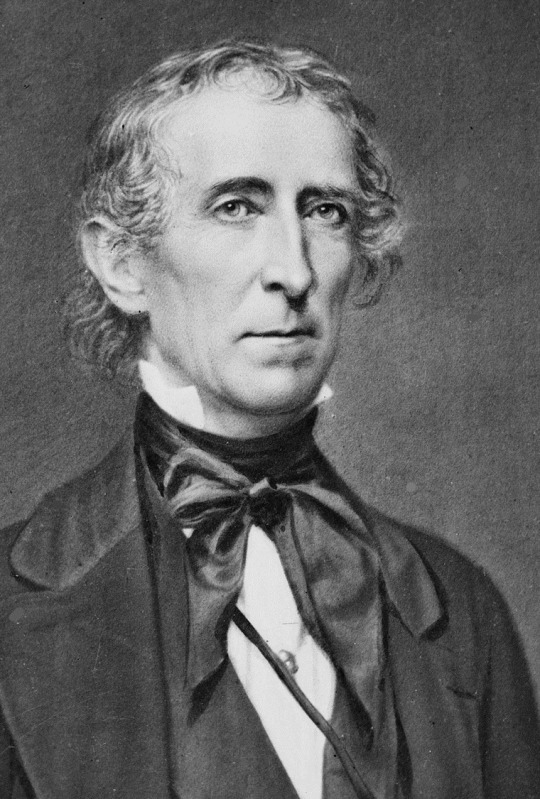
John Tyler
"His Accidency"
Basic Info
b. March 29, 1790 - d. January 18, 1862
From: Charles City County, Virginia
Party: Whig / Independent
Term: April 4, 1841 – March 4, 1845
Like Monroe, Tyler was another sign for the an end of an era as he was the last president elected from Old Virginia elite. His accidental landing in the executive chair came after serving only a month under William Henry Harrison which led to drastic jealousy that plagued him and the efficacy during his term. With experience in law (serving as Governor of Virginia, Virginia's Congressman, and House of Delegates), his strong personality, and critical policies, John Tyler led the nation to many changes that changed the US.
Main Points of Inaugural Speech:
(Link)
Many people in both parties may be upset with the death of the late President William Henry Harrison and the fact that Tyler is the president now, but it is the way of the Constitution. He promises to hold the Constitution dear to him, make sure to uphold it and carry out his duty "to protect, preserve, and defend."
His policies and philosophies are listed in this speech and he promises to rectify any wrongs he finds. He also promises justice for all in terms of foreign policy, to create a divide between the "sword and the purse" which has caused much trouble in the past. By doing this, it eliminates the risk of unrestrained power landing in the wrong hands.
Tyler has a goal of making sure that the nation doesn't go deep into debt. He plans to end the employment of sinecures (google definition: a position requiring little or no work but giving the holder status or financial benefit). He also makes it clear that the appropriations created in new budgets must be direct and explicit in their purpose.
He promises to give confidence to all transactions of life, to secure industry, and reestablish the public prosperity by following the actions of the Founding Fathers.
The nation must abstain from big government and overuse of power from the federal government since it disrupts the balance that the Constitution was intended to maintain.
Main Conflicts
Economic Policy
Cabinet Disloyalty and Congressional Loathing
Annexation of Texas and Manifest Destiny
Foreign Policy with China
Media
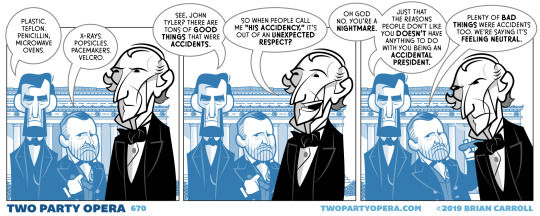
(Link) A modern comic depicting Abraham Lincoln, Ulysses S. Grant and John Tyler explaining to him why he is called "His Accidency" by others. March 29, 2019. Brian Carroll.
Presidential Commentary
Labeled “His Accidency” by those that hated him for the first occurrence of a Vice President entering office due to the death of President William Henry Harrison, John Tyler showed strength against adversity and made many important changes to both the financial, political and geographical history of the United States.
One of the strengths that made Tyler more like his predecessor is his unwavering opinion of what he wished to do. Unlike what the Whig party expected him to do, he kept the same cabinet and people in power that Harrison chose. Most historians argue it was out of respect for the late president, others think it was out of sheer convenience, either way it was important to how the party viewed him and how the policies of the US were impacted afterwards. Sticking to his views, many people quit and his eventual exile from the Whig Party changed how the Whigs conducted themselves. Their vast differences seeped through the cracks with the presidency of Tyler. It was clear through the actions of Whig Party members such as Henry Clay that if Tyler did not stick to his guns about how he felt, what he wanted to do, and his principles regarding what it meant to be president, Clay or another member of the government would have taken advantage of him.
Another strength that stems from Tyler’s ability to stand tall against adversity is his expansionism. Although it did cost money, time, and many lives to change like the natives and those that were moving westward, his foreign policies shaped what the territories of the US were as well as the geographical borders of the US. Following in the steps of Monroe, as many presidents still do, his initial beginning of trying to encourage trade across the Pacific eventually led to the annexation of islands like Hawaii. He also brought important conflicts to end like the official statehood of Florida at the end of his term as well as signing a treaty to establish a permanent border between Maine and Canada. Most importantly, the controversial act of the Annexation of Texas changed the fate of the US. Unlike previous presidents that backed down in fear of war, Tyler headed into what turned out to be a successful annexation. Today, there are different views about what the US should do with Texas but I digress. These were all important issues that determined the future of the US and how the geography looked as well as trade continued to succeed. If it weren’t for the acts and compromises made during Tyler’s presidency the US would have looked different and the conflict between the US-Canada border on the eastern side would have continued for much longer.
Although there were strengths with Tyler’s presidency, there were weaknesses. The uncompromisable nature in his relationship with the Whigs cost him time, energy, and trust between party members. His constant vetoes against the bills on the national bank, how to handle the tariffs and funds, as well as the judicial appointments where only one nominated was appointed to the Supreme Court, were all examples of the downfalls of conflict between the Legislative and Executive branches at the time. Perhaps if Tyler passed some of the notions that the Whigs felt were important or hired people from the Whigs Party, there would have been more compromise and less stalemates over the course of these four years.
Overall, Tyler is not one of the presidents that many think about when ranking important presidents but his actions in the white house proved him to be a man of great significance. His strong personality and commitment to strict constructionism helped protect the principles of the Constitution.
Citations/Links
https://millercenter.org/the-presidency/presidential-speeches/april-9-1841-address-upon-assuming-office-president-united
https://millercenter.org/president/tyler
https://www.senate.gov/legislative/nominations_new.htm
0 notes
Text
Martin Van Buren
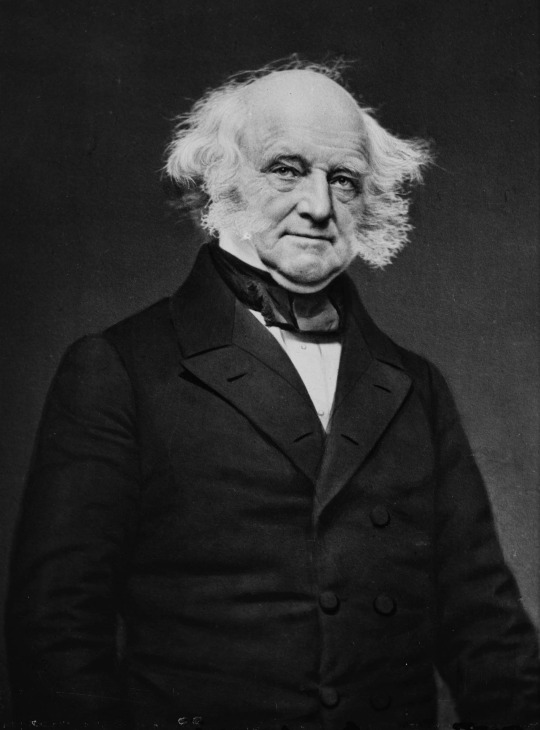
Martin Van Buren
Basic Info
b. December 5. 1782 - d. July 24, 1862
Term: March 4. 1837 - March 4, 1841
VP: Richard Mentor Johnson
Party: Democrat
From: Kinderhook, NY
Originally from a Dutch-immigrant family of New York, Van Buren was a superb orator, a long-time lawyer, politician and frequently called the "Sly Fox" by others around him. Other positions held by Van Buren included the State Attorney General of New York, Minister to the UK, Secretary of State under Jackson, Vice President during Jackson's second term, and Governor of New York. Although he failed to ever get a second term, his efforts to calm down the Panic of 1837, the compromise of the Second Seminole War, and other events framed his presidency as important to the domestic effort to keep citizens at peace.
Main Points of Inauguration(s): (Link)
The office of the executive branch has fallen on honorable, courageous men. It is very humbling and Van Buren thanks his supporters.
Van Buren mentions how his train of thought might be ahead of it's time but nevertheless he will coordinate with the multiple branches of government.
The nation has been successful in terms of foreign policy, domestic policy, and the "Great Experiment" created by the Founding Fathers continues to succeed since the nation has already been through war, financial crises, and foreign disputes and they continue to adhere to those principles in the Constitution.
If the people adhere to the principles of the Constitution, the people are destined to confer their benefits on countless generations after and prove to the world that popular government, with wisdom, can continue to be used effectively.
The impact of parties has shown great conflicts and many bitter fights but it has not driven the true spirit of the Union away but we must remain careful. Issues such as slavery might drive us apart, and like the preceding presidents we must remain calm on serious issues.
Van Buren makes it clear that he is against the abolishment of slavery, which is a pretty big comment to say, and says that he will veto essentially any bill to deal with abolishing it, changing it in where it already exists or impeding on state's rights for it. His rationale behind this is that maintain slavery will not ruin the Constitution and keep the Union alive.
Main Conflicts
Election of 1836
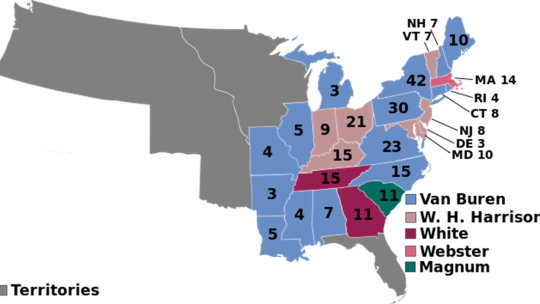

The creation of the independent US Treasury (created in 1840)
The Trail of Tears continuation and the Second Seminole War
Panic of 1837
Annexation of Texas
Media
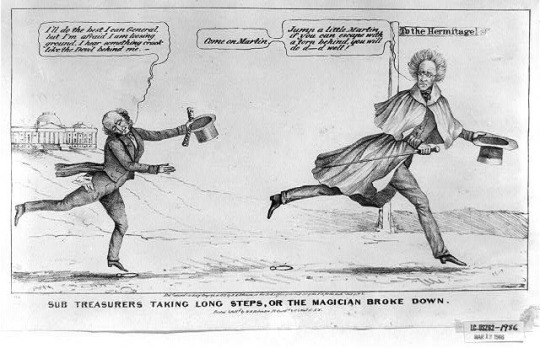
Martin runs after Jackson in his return to the "Free Soil" mocking him for always being in his predecessor's footsteps. Library of Congress. c. 1848.
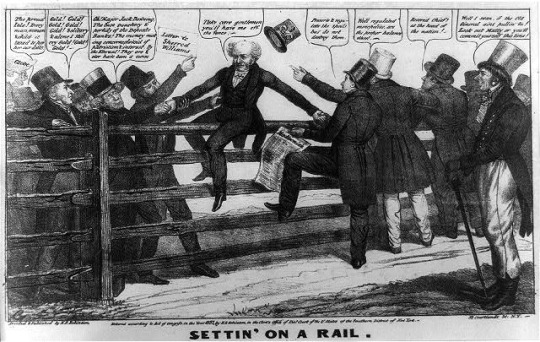
Settin' On A Rail by Edward Clay and Henry Robinson, Library of Congress. c. 1837.
This was a political cartoon about Van Buren's moderate thinking about the bank issue where he was unable to come to a decision that satisfied all members.
Presidential Commentary
As a long-time politician and known for his sneaky skills, it is obvious there were some successes and defeats within Martin Van Buren’s presidency. His career showed his immense dedication to the Union and the success of the nation.
Van Buren made comments in his inauguration about how he was ahead of his time, but his stance on the slavery issue was not reflective of that. He was ardently against the notion of abolishing it, making it seem as though he was like many others of his time. Although it was justified as the only option of preserving the union, it would end up blowing into a full-on war only about twenty years later. It is not definite that the end of slavery would be an easy task on a president, but a little more compassion would have sufficed in his inaugural speech. This goes in connection with his moves on the Native Americans and his continuation of the Seminole relocation which even included internment camps. His participation of the Trail of Tears completely changed the outcome of what the Tribes could have looked like today if he gave into more lenient policies such as John Q. Adams had.
On the other hand, he was ahead of his time with the idea of keeping the politics influencing government out of the national bank. His proposal of the independent US treasury was needed because of the issues along with the recharters. Each party had their own mindset on banks and how it should be preserved (as seen with his colleague and predecessor Andrew Jackson). This economic crisis did last until the next election, and it ultimately let the Whigs campaign against Van Buren as he was seen as an extension of Jackson and his policies and cost him a second term. Nevertheless, this action of his was intelligent and needed after over five decades of conflict over the banking system of the United States. It showed his true skills in handing domestic disputes and his modernness.
Another issue that Van Buren dealt with was the annexation of Texas. As his predecessor was an aggressive general who would have gladly taken over the land, the experienced Van Buren turned to reach a compromise. This was when he was able to calmly end the matter on the reasons of it being against what the Constitution stood for and the disinterest of starting a war with Mexico. It also connected with the fact that encouraging annexation of Texas meant considering whether it would be a slave state, which would unleash yet another debate about voting rights, the seats in Congress, and the morals of the nation, which were all issues that Van Buren did not want to attend to during an era where there was already so much trouble financially. His calm, efficient manner proved him to be a reliable president able to steer in the difficult waters of presidency.
Overall, Van Buren was never able to get reelected and even though his stance on slavery was anti-abolitionist it changed by the end of his presidency. Living to see the beginnings of the nation and dying by the end of an era of slavery, his experience and skills made his presidency an important one to remember while thinking about how to preserve a nation in financial crisis.
Citations
https://millercenter.org/the-presidency/presidential-speeches/march-4-1837-inaugural-address
https://www.loc.gov/item/2008661308/
https://www.nps.gov/articles/martin-van-buren-s-return-to-the-soil.htm
https://millercenter.org/president/vanburen/domestic-affairs
1 note
·
View note
Text
Andrew Jackson
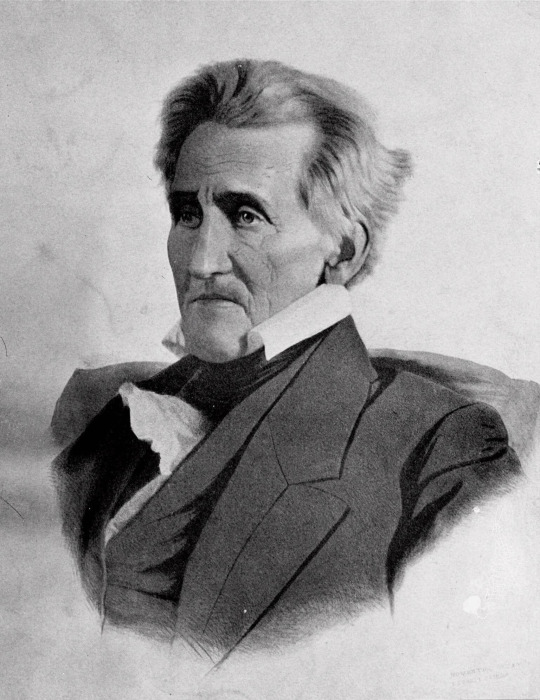
Andrew Jackson
"King Andrew I"
Basic Info
B. March 15, 1767 – d. June 8, 1845
Term: March 4, 1829 – March 4,1837
Party: Democratic
From Carolinas/Tennessee
VP: John C. Calhoun and Martin Van Buren
Known as a brutal General that had led to many of the successful efforts of the US in expansionism and conflicts with Natives, Jackson was an icon of advocating for the “common man” which was much different than John Q. Adams. He was a southern slave-owner that believed in maintaining slavery, adopting the “spoils system” into government, and his presidency was one of the worst in terms of protecting Native American rights. His impact on the banking system is what makes his face appear on one of the dollar bills.
Main Points of Inauguration(s):
March 4, 1829 (Link)
Jackson puts emphasis on abiding by the limitations listed in the Constitution for the executive branch, promises to preserve peace with foreign nations, and to have respect for those that are in the Union
He promises to facilitate the end of national debt (which he achieves) and to make sure the officers in charge are doing their job.
He promises to give the people a just and civil authority, especially for the native tribes. (The Trail of Tears).
He acknowledges that he might not have all the experiences of his predecessors but he will try his best
March 4, 1833 (Link)
He acknowledges the various successes of the nation, including the foreign policy and the important representatives that help advocate for the constituents
He mentions his duty to the Constitution and the duty to patriotic submission to the laws of the nation. He pushes for all to listen to his plead of the importance of state governments instead of annihilating them. This is to preserve the union between them.
"Without union our independence and liberty would never have been achieved; without union they never can be maintained."
All eyes are on the nation and it is now that we must make sure that the connections between states and the integrity of the states remain intact.
The nation must remember that one must give up a share of liberty to preserve the rest.
Main Conflicts
Reform in the rotation of offices
Uncovering fraud carried out by officials
Nullification - the forefront issue of Sectionalism
The Bank War (McCulloch vs Maryland)
The Eaton Affair
Media
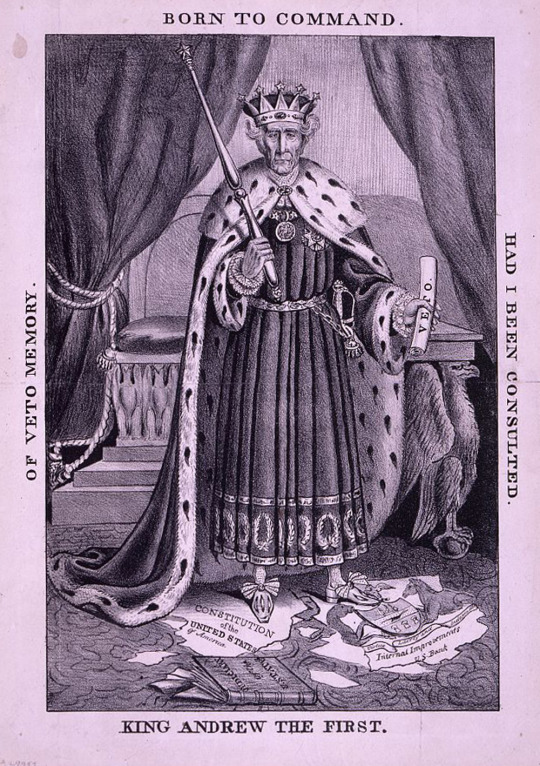
Courtesy of Library of Congress, Weitenkampf, 1833 - in relation to the veto of the Bank recharter.
Presidential Commentary
The presidency of Andrew Jackson was a turning point in US history. The amount of progress made, in almost all varying aspects of the nation, was a new precedent that should remain in high importance of presidential history.
One of the strengths seen in the Jacksonian era of history is the success of national reform in terms of financial debt. The fact that Jackson was able to eliminate the national debt and come out with a surplus of $440,000 is something that the nation had never seen before, nor was it achieved ever since. The cutting of spending which he deemed extravagant and the uncovering of fraud that littered the official offices of government, even the Postmaster of the time. These two actions set a precedent that to this day seems to be unreachable as the nation is now in the trillions of dollars of debt. This was what made his actions to be held in high regard and made him a strong president.
Another action that was historic of Jackson was his treatment of the Native Americans. His strict policy of expelling tribes to the western part of the US changed the landscape of the nation forever. The path now known as the Trail of Tears was the nail in the coffin and led to the essential decline of the natives in the US after the years of “civilization” school originally created by Monroe and lack of action from Adams. His disregard for their civil liberties and rights forever changed how history was taught, the history of our nation, and the population of Native Americans.
The people also held onto Jackson with high pride for the way that he dealt with the Nullification crisis. This was the effect of the Tariffs of Abomination, mentioned in the John Q. Adams post, and South Carolina threatened to succeed from the union. Although there were these threats, they were pounded by Jackson in his declaration that the federal law was more powerful than state laws. In a final way to compromise with the south, Henry Clay – a senator in 1833, helped to write compromise tariffs to lower those taxes over the next decade (5). If it weren’t for Jackson, perhaps the nation would not have adopted the commands that the federal law precedes the state laws.
Finally, one of the most legendary events that happened in the period of Andrew Jackson was The Bank War that occurred after Congress tried passing a rechartered bill (5). Despite Congress passing it, and the Supreme Court declaring that a national bank established by the government was constitutional in the case of McCulloch v. Maryland, Jackson vetoed it. This was because he thought that it was a creation of the “privileged class” and gave people too much power. One can see his argument, but it still negatively impacted the transactions of the national government and hindered much of the progress need financially. His final kick to the stomach of the bank system was his demand to empty the national bank and deposit to the state banks to weaken the national system. The impact of this action by Jackson induced the creation of the Whig Party which was essentially an umbrella party for anti-Jackson parties.
There is no telling what the US would have been like if Jackson was not elected to office but it is safe to say that without him the US government would not be the same and nor would the current amount of debt. The leadership that he showed to reform and his legacy on the natives are important actions that cannot be forgotten or discarded.
Citations/Links
https://avalon.law.yale.edu/19th_century/jackson1.asp
https://avalon.law.yale.edu/19th_century/jackson2.asp
https://iowaculture.gov/history/education/educator-resources/primary-source-sets/caucuses-and-elections/king-andrew-first
https://www.history.com/topics/19th-century/bank-war
https://www.whitehouse.gov/about-the-white-house/presidents/andrew-jackson/
2 notes
·
View notes
Text
William Henry Harrison
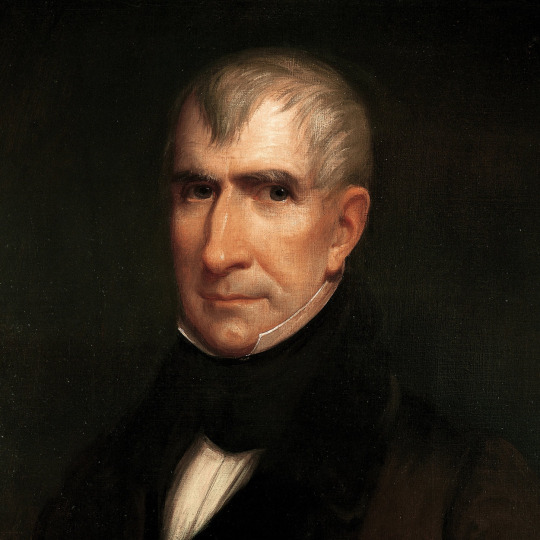
William Henry Harrison
Basic Info
Presidential Term: March 4, 1841 - April 4, 1841
From: Ohio
VP: John Tyler
Party: Whig
He was born at Berkeley in 1773. He studied at Hampden-Sydney College, then began the study of medicine in Richmond. This was until 1791, when Harrison decided to get a commission as ensign in the First Infantry of the Regular Army, and headed to the Northwest, where he spent much of his life. He started his own political career as Secretary of Northwest Territory, then becoming governor of Indiana. Once elected, he delivered the longest inaugural in history, and served a little over a month before becoming the first president to die in office in 1841. With him died the Whig Party.
Main Points in Inaugural (Link)
The great danger is not from the government but by the accumulation by the department of that which was assigned to others, which was the accumulation of Presidential actions.
Far different is the power of our sovereignty than other nations. It can interfere with no one's faith, inflict no punishment but after proven guilt, the result of investigation under rules prescribed by the Constitution itself.
These precious privileges the American citizen derives from no charter granted other than the Constitution.
As was to be expected, disputes have arisen as to the amount of power which it has granted or was intended to grant to the Congress. Republics, therefore, can commit no greater error than to adopt or continue anything that might lower the power of these rights of citizens.
The veto power that the executive branch holds is a conservative power that must be used to protect the constitution, then the people, then the other minorities. Not singular priorities or party issues.
It should be considered proper that an altogether different department of the Government should be permitted to originate the bills, but nevertheless it is strange to consider only one part of Congress should originate the bill.
The legislators are not the subjects of the people of the States, but free American citizens. Based on the great principle of unalienable rights insisted upon in our Declaration of Independence, they could neither make nor the United States accept a surrender of their liberties and become the subjects of their fellow citizens.
Out of all the important things to remember, we must remember the importance of the union, since it is the only true and sure guarantee of all others.
Main Conflicts
Unorganized before heading into office
Calling Congress into Session to talk about the funds.
Media
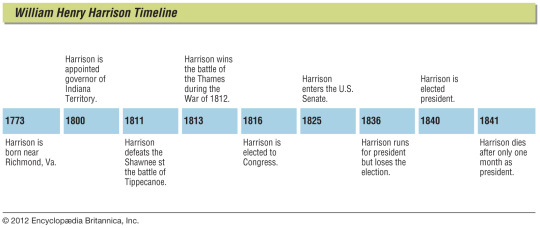
Presidential Commentary
Since the presidency of Harrison was short, there were not many conflicts like the previous ones before him. However, it seems to be that the main conflict during his month-long presidency includes the increasing amount of people trying to control the appointments of the president. Many of his problems lie in the disrespect people kept pushing onto him and even in his campaign many people called him "Granny Harrison" to talk about his resignation during the War of 1812. After being tired of the disrespect, he said to Henry Clay, "You forget thatI am the President" during one of their conversations. He later spurned Clay by electing Daniel Webster for his Secretary of State. This proved to be important to the United States when dealing with power in the Whig Party.
The astronomical amount of people who wished to benefit from the election of Harrison continued as many people visited him and he was to have extensive social obligations. This was his own weakness as he refused to listen to the advisors and mentors around him that told him to decide before the inauguration. His lack of organization and vetting the people that applied to work under his presidency ensued chaos and it is no wonder that he was so ill at the end of his life. The amount of stress could have been avoided if he had the right help and not those who slithered around him trying to take as much advantage as they could of him.
However, one of the notable things that Harrison did was not bending over to other people’s will. For example, because the Whigs had lost the last election and were trying to push their policies, they attempted to remove all the Democrats from power. Harrison, who always seemed to know when to put his foot down, made sure that the other officials in government know who the President was and told them he would rather resign than be unfair towards the other party (4). These are examples of a strong, confident leader that proved to be useful in his other decisions, although there were not many.
Looking back at the presidency of William Henry Harrison, although there is not much to analyze, he was a man of seriousness and fairness and not the “Granny Harrison” Democrats labeled him to be. The inaugural address, however long it might be, was important to the common man in understanding what the president believed about the Constitution and what values he held in his mind while trying to begin his presidency. The acknowledgement of what impact both Jackson’s presidency and Van Buren, as well as the justifications of how he thought, further proved his care for the nation. His years of experience in the military proved vital in his demand for respect out of the people trying to use him to get what they want. He was a strong man and might have had a successful presidency if he adopted more organized methods and wrote a shorter speech.
Citations
https://avalon.law.yale.edu/19th_century/harrison.asp
https://www.britannica.com/biography/William-Henry-Harrison
https://www.whitehouse.gov/about-the-white-house/presidents/william-henry-harrison/
https://millercenter.org/president/harrison
0 notes
Text
John Quincy Adams
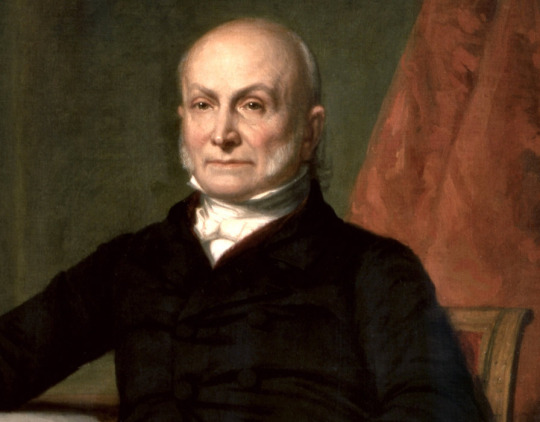
John Quincy Adams
Basic Info
b. July 11, 1767 – d. February 23, 1848
Party: Democratic-Republican & National-Republican
From Massachusetts
Served from 1825-1829
Vice President: John C. Calhoun
Won from being chosen by the House of Representatives against Andrew Jackson, he grew up in the world of government as his father was the second president of the US. With a background from Harvard and years of experience in politics. He was once the Secretary of State under James Monroe, which he exceeded with his high diplomatic skills. He was seen as one of the most prepared people to become president and his presidency was shaped by dealing with foreign relations and domestic affairs as smoothly and neutrally as possible in order to preserve the union.
Inaugural Speech Points (Link)
Copied the preamble of the Constitution, making sure he didn’t want to be dragged into controversy.
The causes of dissensions vary, but the Great Experiment (crowned with success from founders) must be preserved.
The two great political parties have both contributed greatly to our nation. Both were loyal, had integrity, and were patriotic
Blamed the nation’s problems on European revolutions taking place to dissuade people from the US controversy
Encouraging people to let go of the party animosity because what really matters is the Union.
Main Points of Conflict
Improvements for transportation infrastructure
Lenient Native American Policies
Approval of Smithsonian Institution
Tariffs of Abomination
Media
https://www.washingtonpost.com/podcasts/presidential/john-quincy-adams-the-trait-that-broke-a-presidency/
Presidential Commentary
Regarded to many historians as a superb diplomat that was a symbol of modernity, John Q. Adams had many important decisions made during his one term presidency and even before it, as he was one of the people that helped in instrumenting the Monroe Doctrine. Like his father, he only served one term but that one term was enough to influence the nation and its policies.
One of the most distinct features of Adams was his push towards neutrality. His aim towards keeping the peace was often marred by the Jacksonian Democrats and those wishing for more expansionist policies. First, Adams was known for his policy being the most enlightened towards the Native Americans. For example, his threats against Georgia for the Treaty of Indian Springs were never followed through because of opposition from those pushing towards the western frontier. Afraid of starting a civil war, Adams eased off. Although he eased off on this issue, the issue of slavery remained. He was passionate about anti-slavery advocacy and even anticipated the Emancipation Proclamation when he mentioned that if it came to it, the President could do away with slavery through war powers – which Abraham Lincoln did.
Another distinct part of Adams’ presidency was the notorious political method of Vice President Calhoun called the “Tariff of Abomination” that imposed incredibly high tariffs to help support expansionism. This caused outrage and ruined his chances of reelection, even though he was not the one that distinctly created it. Both northern industrialists and citizens of the south were fed up with the cuts in their financial lives and sealed the fate of the presidential election of 1828. If a more lenient policy were created towards the south, and a smaller percentage of the northerner’s industrial revenue perhaps there would be a better chance of Adams winning a second term.
One of the most interesting parts of Adams’ character is his appreciation for modernity which can be seen as his push towards improving the US internally such as roads, ports, canals, and trying to establish a national university. His acceptance and creation of the Smithsonian still impacts the US today in terms of preserving public history which, during the time, was not as valued as it could have been. The establishment of the other improvements were one of the many steps towards an even bigger infrastructure improvement in the future. The connection of the Great Lakes to the Ohio River system, creation of canals, and many other events helped to rapidly develop the midwestern cities such as Cincinnati and Cleveland for example. Without the focus that Adams had on the infrastructure at the time, there is no telling how the creation of the highway and other national roads would have looked like today.
His legacy continued after his defeat by Jackson as he was one of the only presidents served congress for 9 terms in the House of Representatives after being president. His dedication to the improvement of the nation is seen in his work and his policies, although not many, impacted the politics and government of the US.
Citations/Links:
https://avalon.law.yale.edu/19th_century/qadams.asp
https://www.khanacademy.org/humanities/us-history/the-early-republic/politics-society-early-19th-c/a/the-presidency-of-john-quincy-adams
https://millercenter.org/president/john-quincy-adams/key-events
https://history.house.gov/Historical-Highlights/1800-1850/The-Tariff-of-Abominations/
0 notes
Text
James Monroe
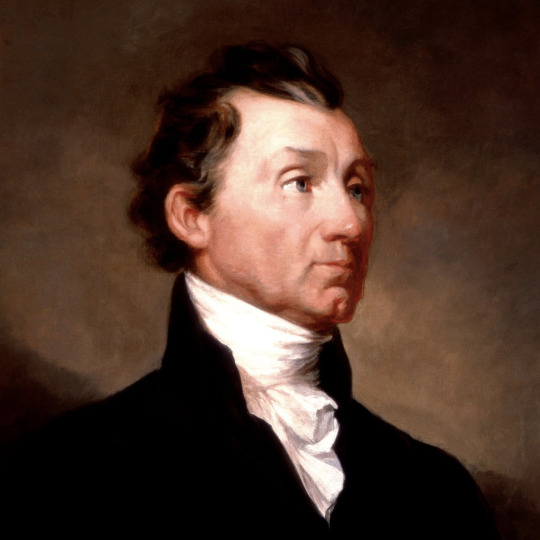
James Monroe
Basic Info
b. April 28, 1758 – d. July 4, 1831
Served from 1817-1825
From Virginia
Party: Democratic-republican
Vice President: Daniel D. Tompkins
One of the last of the Founding Fathers to be elected and president, James Monroe was from the planter class of Virginia like some of the previous presidents. Other positions that he held in government included Secretary of State, Governor of Virginia, and Secretary of War. The man known as the "Last Cocked Hat" left a legacy on how to deal with partisan and international affairs that continues to this day.
Major Points in Inaugural Addresses
March 4, 1817 (link)
The "Great Experiment" is a success
Any conflicts that our nation faced was dealt with and quickly won because the nation is strong
The government that the nation has is based on principles that helps sustain peace. This includes enjoying civil liberties and rights, protection from foreign powers, and electing officials that are worth having in power
"Government elective in all the branches, under which every citizen may be by his ment to obtain the highest trust recognized in the Constitution" meaning the citizens have the power to create soverignty
The greatest defense is good offense to prevent war
March 4, 1821 (link)
In order for policy by a preceding administration to be sound, all the principles must be clear to the constituents by the enforcer.
The nation has increased its peace by fortifying the naval forces and continues to strengthen itself through fortifications after the War of 1812. These measures have been taken in goodwill, not out of hate. Attention to foreign affairs is critical to the US and its success.
Neutrality will be the best option for our nation in these peaceful times.
A great asset, Florida, has been obtained. We have reconciliated with France and Britain has yet to come to an agreement with trade.
Our revenue has diminished and we are dealing with financial issues. If we continue to have these issues, I will seek loans which should solve the problems.
We have pushed the natives onto independent nations (reservations) and many instances have been paved to lead to their destruction. Our path to expand west is succeeding and there is hope Congress will help push this further.
Europe is again in turmoil but fear not, they will not knowingly mess with the US. We are united and strong against threats, as it has been proven before.
By appeal to the good sense of the people, there is every reason to believe that our system will soon attain perfection of which human institutions are capable, and that the branches will exhibit such a degree of order and harmony to earn admiration and respect.
Major Conflicts
Raiding of Seminole Indians
Late Treaty with Spain & Acquisition of Florida
Reestablishing commerce with Britain
Moving Natives from their tribal land
Missouri Compromise*
Panic of 1819
Monroe Doctrine
Media
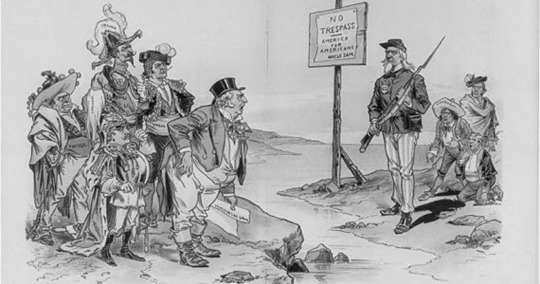
Library of Congress - Judge Magazine, Feb. 15, 1896.
In this cartoon there is a clear divide between the US and European powers as portrayed through a strong poster by Uncle Sam and his stance there at the edge. There is a lasting legacy even more than 50 years later related to the Monroe Doctrine.
Presidential Commentary
As one of the last Founding Father Presidents, James Monroe was known as the “Good Feelings Era” president and helped to establish the United States as one of the biggest powers in the world. Monroe was truly a jack of all trades with positions including Secretary of War and State, as well as ambassador to France and Britain. With the experience in cabinet and as ambassador, teaching from other founding fathers such as Thomas Jefferson, many of the influential conflicts impacted US government and politics that cannot be ignored.
During the presidency of Madison there was much expansion. One of the most important examples of expansionism is the Treaty of 1818, the treaty that co-occupied Oregon with the United Kingdom. This later became one of the states of the US and it was an important step in fishing and land rights for the nation. This stretched the US from the Atlantic to Pacific Ocean. With expansion came responsibility. One of the most important acts that Monroe signed during his presidency includes the Missouri Compromise, which was signed after many attempts of trying to figure out what was the right of the state after being admitted into the union. Many argued that keeping it a free state would ensure balance in the senate but was disregarded and admitted as a slave state only since Maine was admitted as a free state. This act caused controversy and led to Supreme Court cases such as Dred Scott v. Sandford (1857) and bills to repeal it such as the Kansas-Nebraska Act in 1854. Although the Missouri Compromise did not solve the issues permanently, Monroe’s presidency was needed to prevent earlier war for a nation that had just seemed to be peaceful after two big wars.
With expansion, the Monroe Doctrine quickly followed. The Monroe Doctrine is seen as one of the first steps in the US becoming its own empire. Since the expansion of the nation happened so rapidly, and there was a lower reliance on foreign imports because of the increase in resources, Monroe wished to end European colonialism. The president also considered that any future colonies in the Americas hostile acts against the nation, as he wished for the US to stay neutral in any European affairs. This left an impact both domestically and internationally. First, the strength that the doctrine had impacted the economy of the colonizers like Spain, France, and the United Kingdom. For centuries these empires had ruled the world and for a new and upcoming superpower like the US to claim that they will protect those with a republican government, is a sign of changing times. No longer would those who own empires claim land that was not theirs to claim. It is a sign of liberty and humanity and cannot be forgotten as future presidents continued to push towards more nation to be like the US and not adapt systems like monarchies or communist forms of government.
Another important fact about Monroe’s presidency is the push towards peace. His disregard for parties in choosing positions in lower levels of government helped the laws and acts that Congress wished to pass. By doing this he reduced tensions with party members on both sides. However, later he even ran without competition from an organized party because of the collapse of the Federalist party during the 1820 election. On the other side, the president also tried to provide passage to West Africa for those descendants of kidnapped slaves. They later named the capital of Liberia, Monrovia. Both the methods of election and treatment of people continued the “Good Feelings Era” and sustained domestic peace, an important aspect after so many instances of tension building and battles.
To conclude, Monroe’s presidency was the end of an era and a peaceful one to end with but his legacy remains. Many of the important ideas that he helped with shaped the nation and cannot be forgotten in terms of partisan conflict and foreign policy.
Citations/Links
https://www.whitehouse.gov/about-the-white-house/presidents/james-monroe/
https://avalon.law.yale.edu/19th_century/monroe2.asp
https://www.loc.gov/item/2002697703/
https://www.youtube.com/watch?v=QnsmuPW9qTY
0 notes